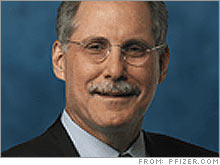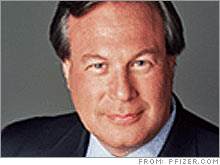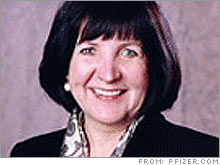|
And the next Pfizer CEO is...
Three ambitious executives are vying to succeed CEO Hank McKinnell.
NEW YORK (FORTUNE) - If only the rest of Big Pharma were as lucky as Pfizer. In the midst of what most top-level managers agree is a CEO talent drought, the New York-based pharma-colossus has no less than three potential CEOs vying to take over when current top guy Hank McKinnell retires in 2008. But there are quite a few sharp elbows being thrown in the race to the top. Last year, Pfizer (Research) CEO Hank McKinnell promoted three ambitious top executives -- Karen Katen, head of sales and marketing, Jeff Kindler, general counsel and David Shedlarz, chief financial officer -- expanding their responsibilities and bestowing each with a vice chairmanship. The race was on. And one of them will emerge as the 13th CEO in Pfizer's 157-year history. (To see more about the challenges Pfizer faces, see the FORTUNE magazine feature.)
Katen and Shedlarz appear to be working nicely together. Last year, they were given the onerous task of cutting $4 billion in annual costs by 2008. Less than a year into the project, they have already achieved more than $800 million in savings, well ahead of schedule. But insiders claim their succession battle is creating factions, and distracting the company from its larger goals -- namely: becoming a growth company again. "There are David people and there are Karen people," says one insider of the two leading candidates. "And they're all pulling in different directions, trying to make their guy look good." So far the handicapping goes like this: Katen was seen as the early favorite, but she's fading fast. Kindler was always the dark horse. If a front-runner has emerged, it's David Shedlarz. The former CFO is widely respected within the company. He has always been seen as a McKinnell protégé who's capable of carrying on Pfizer's do-or-die acquisition strategy. Indeed, in recent months, Shedlarz has taken a lead role in smoothing over Pfizer's frayed relationship with the investment community. McKinnell's Pfizer has been accused of being too close-to-the-vest with research and financial disclosures. In a series of meetings with large investors over the last month, however, Shedlarz has been more open and forthcoming about Pfizer's financial future and early-stage pipeline. Shedlarz's Wall Street PR campaign has led some to speculate that he might assume the CEO position sometime later this year, with McKinnell staying on as chairman of the board until 2008. Even with all the scrappy in-fighting, Pfizer's embarrassment of riches surely makes competitors envious. Discovering drugs, developing them for human consumption, and selling them in an increasingly competitive marketplace requires specialized managerial expertise in each division. As a result, drug companies are grooming executives with vast knowledge of their specific divisions -- be it sales, research or manufacturing. Amid the backdrop of myriad challenges facing big drugmakers -- increased competition from generics, a dramatic slowdown in research productivity and political pressure to hold down prices -- companies need a leader with broad abilities. But few have an executive waiting in the wings capable of stepping into the lead role. Merck (Research), for instance, famously hunted high and low in a search that ended with Richard Clark, the company's cost-cutting, former head of manufacturing. In a surprise move earlier this week, Clark hired outsider Peter Loescher to lead Merck's Global Human Health Group, a newly integrated sales and marketing division. On paper, Loescher comes with real corporate pedigree. He most recently served as president and CEO of GE Healthcare Biosciences. Though Loescher won't start at Merck until May, company insiders are already speculating that he's the guy beat for the CEO position when Clark reaches the mandatory retirement age of 65 in five years. If Merck's April 3rd, 8K SEC filing is any indication, the company places a high value on Loescher. According to the disclosure, Loescher's base salary is $1.1 million with a performance bonus potentially as high as $1.3 million -- roughly the equivalent of CEO Clark's income. Loescher will leapfrog a host of top executives within Merck whose skills were considered too specialized to be CEO during last year's search. Those executives include Brad Sheares, current president of U.S. Human Health, and Margaret McGlynn, president of Merck's vaccine division. They each will now report to Loescher. The results could be just as incendiary as the struggle for power at Pfizer.
Plugged In is a daily column by writers of FORTUNE Magazine. You can reach today's columnist, John Simons, at jsimons@fortunemail.com. FORTUNE 1000 Companies in Your State |
|



